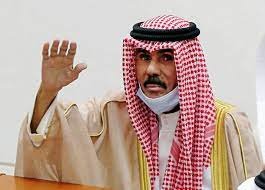The Emir of Kuwait, Sheikh Nawaf Al-Ahmad Al-Jaber Al-Sabah, who succeeded Sheikh Sabah Al-Ahmad Al-Jaber Al-Sabah, died at the age of 86, according to what the Amiri Diwan announced, after a reign that lasted three years and was marked by repeated political crises in the oil-rich Gulf state.
The Amiri Diwan said in a statement, “With great sadness and sorrow, we mourn the death of the late His Highness Sheikh Nawaf Al-Ahmad Al-Jaber Al-Sabah, the Emir of the State of Kuwait, who passed away to his Lord this afternoon, Saturday.”
Earlier, Kuwaiti television cut off its programs to broadcast the Qur’an before the Amiri Diwan announced this.
The Emir of Kuwait was admitted to a hospital in November “following an emergency health problem to receive the necessary treatment and medical examinations,” according to what Kuwait News Agency (KUNA). Then it was later announced that his condition was stable.
The Emir of Kuwait, Sheikh Nawaf was named Crown Prince in 2006 before succeeding 2020 his half-brother Sheikh Sabah Al-Ahmad Al-Jaber Al-Sabah, who died in September of that year at the age of 91.
He had to lead his country’s economy during an economic crisis caused by the decline in oil prices which led to international agencies lowering Kuwait’s credit rating in 2020.
He will also be replaced by his half-brother, the current Crown Prince Sheikh Meshaal Al-Ahmad Al-Jaber Al-Sabah, who is 83 years old.

The Emir of Kuwait’s life
Sheikh Nawaf was born in 1937. He is the fifth son of Sheikh Ahmed Al-Jaber Al-Sabah, the late ruler who led Kuwait from 1921 until he died in 1950.

The State of Kuwait, located near Iran and Iraq, is rocked by recurring political crises between figures from the ruling family and Parliament, which has been dissolved several times. Within three years, the country witnessed the formation of seven governments.
Since Kuwait adopted a parliamentary system in 1962, the Legislative Council has been dissolved about a dozen times. While representatives are elected, Kuwaiti government ministers are appointed by the ruling Al-Sabah family, which dominates political life. Political instability in Kuwait has weakened investor appetite in a country that is one of the world’s largest oil exporters.

The confrontation between the executive authority and Parliament has hindered the reforms needed by the Kuwaiti economy which wants to diversify its resources, a situation that contrasts with Kuwait’s neighbours, who are the other five members of the Gulf Cooperation Council, which are embarking on projects to diversify their economies and attract foreign investors.
Also Read: https://usateller.com/3845-2-saudi-arabia-s-prospects-expo-riyadh-2030/










